Cloud Kitchen Market Research, 2035
The global cloud kitchen market was valued at $44.9 billion in 2023, and is projected to reach $154.9 billion by 2035, growing at a CAGR of 11% from 2024 to 2035. Rise in utilization of independent cloud kitchens by grocery stores, restaurant brands, and multi-branded restaurants has led to the growth of the cloud kitchen market. Moreover, the hectic work schedule of millennial and Gen Z and increase in demand for international cuisines drive the growth of the cloud kitchen market size.
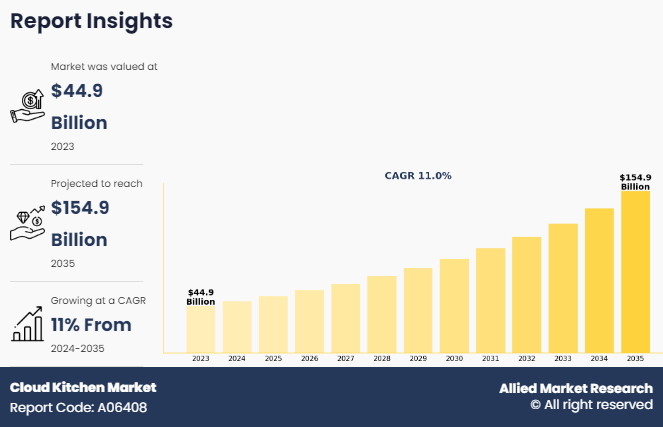
Cloud kitchens are delivery-only kitchens that are owned by a brand or third party working with various brands. Brands that are using cloud kitchens can also operate virtual restaurants or brick-and-mortar restaurants. However, brick-and-mortar restaurants use separate cloud kitchens to provide more efficient delivery. These virtual kitchens make use of technology and data analytics to streamline operations that helps maximize efficiency and minimize overhead costs.
Key Takeaways
- By nature, the fresh cheese segment was the highest revenue contributor to the market in 2023.
- By type, the tangy and tart segment was the largest segment in the global cloud kitchen market during the forecast period.
- By product type, the supermarkets/hypermarkets segment was the largest segment in 2023.
- Region-wise, Europe was the highest revenue contributor in 2023.
Market Dynamics
Rise in the number of young populations globally, along with changing taste preference of consumers has raised demand for online food delivery. Moreover, a hectic life schedule and rise in consumer disposable income are major factors that drive the cloud kitchen market growth in past few years. In addition, increase in use of smart phones, rise in literacy, and easy access to the internet has made ordering food easier. Now a days, food restaurants are tying up with online food service sites such as Zomato for delivery of food and to increase their sales. Moreover, online food delivery services also provide offers, which attract consumers and help in increasing the consumer base. Hence, effective offers and good customer service boosts the growth of the cloud kitchen market share.
Furthermore, there has been an increase in the number of users on various social media sites with rise in internet penetration. Thus, most key players in the cloud kitchen market strategize promoting their products and services on these social media platforms. Social media marketing is one of the major strategies adopted by various companies and industries to promote their product offerings. Thus, rise in the use of social media marketing is anticipated to provide lucrative opportunities for growth of the cloud kitchen market.
However, the increase in the number of fine dining and quick service restaurants such as Subway, McDonalds, Starbucks, KFC, Pizza Hut, Restaurant Brands International, and Dunkin Donuts hampers the growth of the cloud kitchen market. In addition, quick service restaurants have a global presence along with high amount of liquidity, owing to which smaller cloud kitchens are unable to compete with these giants. Moreover, these quick service restaurants have various product offerings, world class infrastructure along with best food delivery services, which attracts consumers. Hence, the rise in the number of quick service restaurants is expected to negatively affect the cloud kitchen market during the cloud kitchen market forecast.
In addition, specialty diet-focused cloud kitchens are creating growth opportunities for the cloud kitchen market by catering to the growing demand for diverse dietary preferences. These kitchens specialize in offering menus for specific diets such as vegan, keto, gluten-free, or paleo, addressing the needs of consumers who seek healthier, allergen-free, or ethically conscious food options. By focusing on niche dietary requirements, cloud kitchens are anticipated to tap into segment consisting of health-conscious consumers and individuals with certain dietary restriction in the market, attracting customers who may have limited options in traditional brick-and-mortar establishments. Also, these specialized kitchens can leverage the scalability and flexibility of the cloud kitchen model to experiment with innovative recipes and ingredients, catering to evolving dietary trends and preferences.
Moreover, specialty diet-focused kitchens can utilize the data-driven nature of cloud kitchens to analyze customer preferences and optimize menu offerings accordingly. Cloud kitchens can fine-tune their offerings to meet the specific tastes and requirements of their target audience through customer feedback, data analytics, and market research. As a result, there will be an increase in customer satisfaction and loyalty, enabling cloud kitchens to stay ahead of competitors by continuously innovating and adapting to changing dietary trends. Furthermore, specialty diet-focused kitchens present a lucrative opportunity in the global cloud kitchen market, offering a unique value proposition that matches with health-conscious consumers seeking convenient, customizable, and diet-specific meal options.
Another significant opportunity lies in the integration of advanced technology solutions to enhance operational efficiency and customer experience. Automation technologies such as robotics and AI-powered kitchen management systems can streamline food preparation processes, optimize inventory management, and minimize labor costs. Additionally, the implementation of data analytics tools enables cloud kitchen operators to gain deeper insights into consumer preferences, allowing for personalized menu recommendations and targeted marketing strategies. Furthermore, the rise of smart kitchen appliances and IoT devices presents opportunities to create interconnected kitchen ecosystems that enable seamless communication and coordination between various elements of the food production and delivery process.
Moreover, the global cloud kitchen market is the expansion into underserved or emerging markets. As urbanization and digitalization continue to reshape consumer behavior worldwide, there is growing demand for convenient and affordable dining options in both urban and suburban areas. Cloud kitchens offer a scalable and cost-effective solution to cater to these markets, providing access to a diverse range of cuisines without the need for substantial upfront investment in physical infrastructure. Thus, the flexibility of the cloud kitchen model allows for rapid deployment and customization of offerings to suit local tastes and preferences. By tapping into these underserved markets, cloud kitchen operators can unlock new revenue streams and establish themselves as key players in the global food delivery landscape.
Segmental Overview
The cloud kitchen market is segmented into type, product type, nature, and region. By type, the market is categorized into independent cloud kitchen, commissary/shared kitchen, and kitchen pods. By product type, it is categorized into burger/sandwich, pizza/pasta, chicken, seafood, Mexican/Asian food, and others. By nature, it is bifurcated into franchised and standalone. By region, it is analyzed across North America (the U.S., Canada, and Mexico), Europe (the UK, Germany, France, Italy, Spain, and rest of Europe), Asia-Pacific (China, Japan, India, Australia & New Zealand & New Zealand, ASEAN, and rest of Asia-Pacific), Latin America (Brazil, Argentina, Colombia, and Rest of Latin America), and Middle East and Africa (GCC, South Africa, and Rest of MEA).
By Nature
By nature, the franchised segment dominated the global cloud kitchen market in 2023 and is anticipated to maintain its dominance during the forecast period. Franchised cloud kitchen accounts for a higher value share, as the segment has a larger customer base, which is loyal to its brand and product offerings. Such kitchens have unique trademarks that are used for promotional activities as well as for selling their products. These kitchens also provide or facilitate customer loyalty programs for customers who frequently order food from cloud kitchens. Furthermore, Halal Guys, a cloud kitchen is working with Fransmart, which is a franchise development company, to develop 400 new independent cloud kitchens to increase its delivery services. Hence, effective franchising strategies adopted by operators boost the growth of the cloud kitchen market.
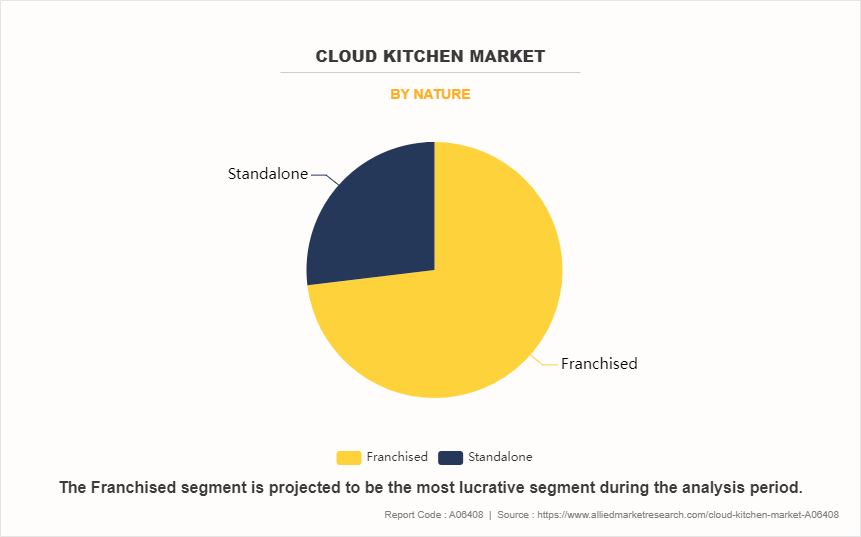
By Type
By type, the independent cloud kitchen segment dominated the global cloud kitchen market in 2023 and is anticipated to maintain its dominance during the forecast period. Independent cloud kitchens dominate the market primarily owing to their agility, adaptability, and lower barriers to entry compared to traditional restaurant chains. Unlike established brands, independent operators can swiftly respond to changing consumer preferences, experiment with diverse cuisines, and pivot their offerings without the constraints of legacy infrastructure or brand image.
Moreover, independent cloud kitchens often require less initial investment, as they can operate from smaller, more cost-effective locations and leverage shared kitchen spaces. As a result, less investment allows entrepreneurs and small businesses to enter the market more easily and compete alongside larger players. In addition, rise in online food delivery platforms has increased access to customers, enabling independent cloud kitchens to reach broader audiences and establish a loyal customer base without the need for extensive marketing budgets or physical storefronts.
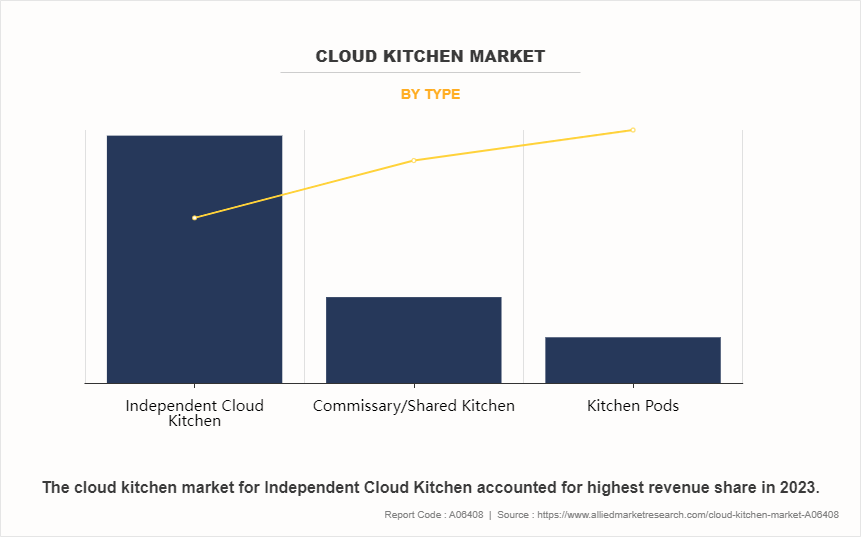
By Product Type
By product type, the burger and sandwich segment dominated the global cloud kitchen market in 2023 and is anticipated to maintain its dominance during the forecast period. These classic comfort foods cater to a wide range of tastes and dietary preferences, which makes them a popular choice for consumers across different demographics and cultures. Moreover, burgers and sandwiches are well-suited for delivery, as they travel well and maintain their quality during transit, ensuring a satisfying dining experience for customers ordering from cloud kitchens.
Furthermore, the customizable nature of burgers and sandwiches allows for endless variations and innovative flavor combinations, that enables cloud kitchen operators to differentiate their offerings and attract customers seeking unique culinary experiences. Thus, with the growing demand for convenient and affordable dining options, burgers and sandwiches continue to drive high sales rates in the cloud kitchen market globally, serving as staple menu items for both independent operators and established restaurant brands.
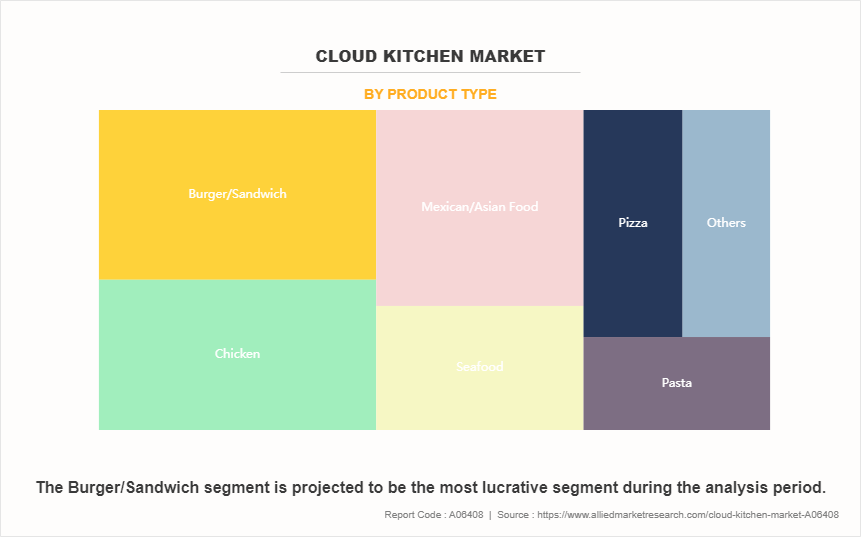
By Region
Region-wise, North America is anticipated to dominate the global cloud kitchen market with the largest share during the forecast period. Rise in population and improved lifestyle are the key factors that drive the growth of the cloud kitchen market. Increase in purchasing power in the region majorly boosts sales of cloud kitchen products in the region. Moreover, consumers are increasingly opting for different types of fast food, resulting in a strong requirement of cloud kitchen products. Thus, the cloud kitchen market holds significant potential and is expected to experience a considerably higher growth rate during the forecast period in the region.
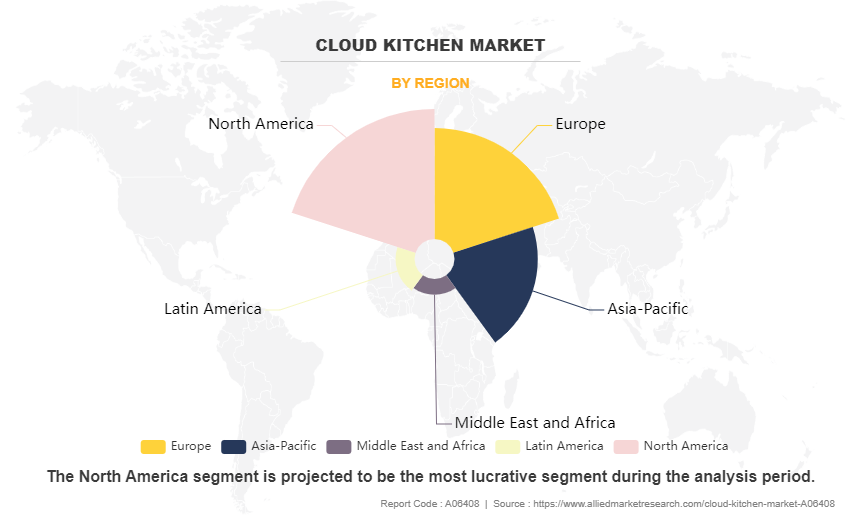
Competitive Analysis
The key players operating in the cloud kitchen industry include Dahmakan, DoorDash, Ghost Kitchen Orlando, Keatz, Kitchen United, Kitopi Catering Services LLC, Rebel Foods, Starbucks Corporation, Swiggy, and Zomato. Several well-known and upcoming brands are vying for market dominance in the expanding cloud kitchen industry. Smaller, niche firms are more well-known for catering to consumer demands and tastes. Large conglomerates, however, control most of the market and often buy innovative start-ups to broaden their product lines.
Recent Developments in Cloud Kitchen Market
- In May 2023, Swiggy announced the expansion of its premium food delivery service, Swiggy Gourmet, to 31 cities in India, including Pune, Kolkata, and Jaipur, to strengthen its foothold in premium food category. In March 2022, DoorDash signed an agreement to acquire Bbot to strengthen its business in the U.S. and offer merchants more solutions for their in-store and online channels, including in-store digital ordering and payments.
- In July 2021, DoorDash expanded its business by opening a temporary kitchen where it will make meals for six restaurants in San Jose, California to expand its offering.
Key Benefits For Stakeholders
- This report provides a quantitative analysis of the market segments, current trends, estimations, and dynamics of the cloud kitchen market analysis from 2023 to 2035 to identify the prevailing cloud kitchen market opportunities.
- The market research is offered along with information related to key drivers, restraints, and opportunities.
- Porter's five forces analysis highlights the potency of buyers and suppliers to enable stakeholders make profit-oriented business decisions and strengthen their supplier-buyer network.
- In-depth analysis of the cloud kitchen market segmentation assists to determine the prevailing market opportunities.
- Major countries in each region are mapped according to their revenue contribution to the global market.
- Market player positioning facilitates benchmarking and provides a clear understanding of the present position of the market players.
- The report includes the analysis of the regional as well as global cloud kitchen market trends, key players, market segments, application areas, and market growth strategies.
Cloud Kitchen Market Report Highlights
| Aspects | Details |
| Forecast period | 2023 - 2035 |
| Report Pages | 285 |
| By Nature |
|
| By Type |
|
| By Product Type |
|
| By Region |
|
| Key Market Players | ZUUL KITCHEN, KITCHEN UNITED, Rebel Foods, GHOST KITCHEN ORLANDO, DAHMAKAN, KEATZ, Zomato, STARBUCKS (STAR KITCHEN), Kitopi, DOORDASH KITCHEN |
Analyst Review
As per the perspective of top-level CXOs, the global cloud kitchen market is expected to offer various business opportunities in the developing economies such as India and China. Innovation is the key for the growth of the global cloud kitchen market, in terms of value sales. Rise in demand for various international cuisines among consumers makes way for manufacturers to come up with cloud kitchens comprising features such as online delivery.
CXOs further stated that increase in the number of young populations globally, along with changing taste preferences consumers has led to rise in demand for online food delivery. A hectic life schedule and rise in consumer disposable income are the major factors that propel the market growth. Furthermore, increase in use of smart phones, rise in literacy, and easy access to the internet have made ordering food easier. Now a days, food restaurants are tying up with online food service sites such as Zomato for delivery of food to increase their sales. Moreover, online food delivery services also provide lots of offers, which attracts consumers and helps in increasing the consumer base. Hence, effective offers and good customer service boost the growth of the cloud kitchen market.
The global cloud kitchen market was valued at $44.9 billion in 2023, and is projected to reach $154.9 billion by 2035
The global Cloud Kitchen market is projected to grow at a compound annual growth rate of 11% from 2024 to 2035 $154.9 billion by 2035
The key players profiled in the reports includes DOORDASH KITCHEN, ZUUL KITCHEN, KEATZ, GHOST KITCHEN ORLANDO, DAHMAKAN, KITCHEN UNITED, Rebel Foods, Zomato, STARBUCKS (STAR KITCHEN), Kitopi
Region-wise, North America is anticipated to dominate the global cloud kitchen market with the largest share during the forecast period.
Increasing demand for online food delivery services, Cost-effectiveness and efficiency of cloud kitchen operations, Adaptation to changing consumer preferences, especially post-COVID-19
Loading Table Of Content...
Loading Research Methodology...


